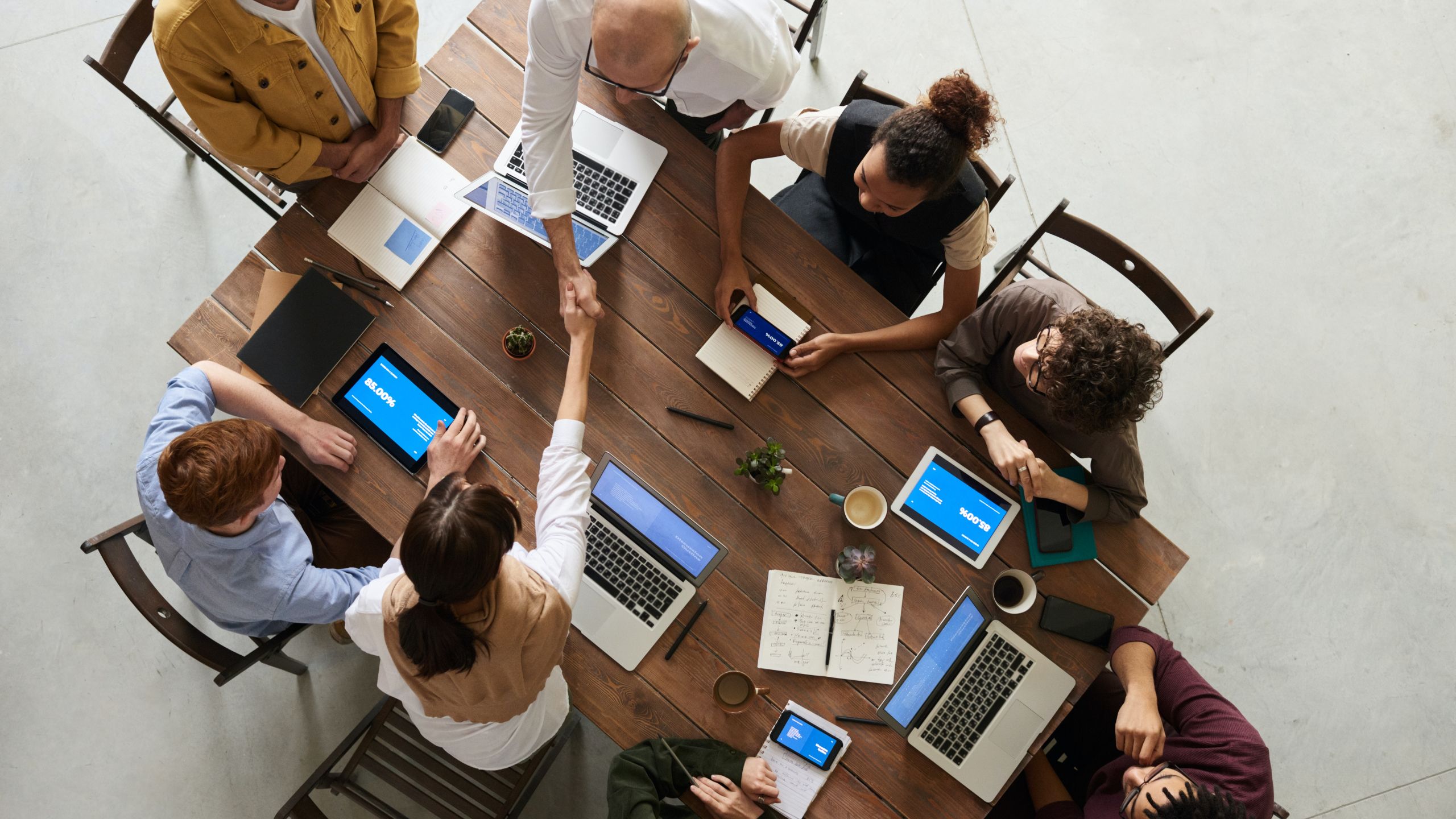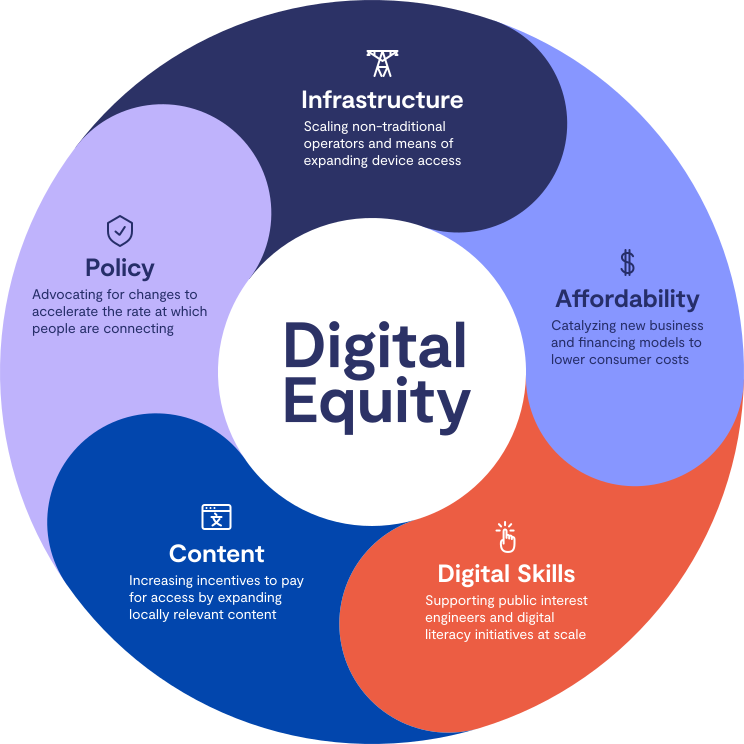State of Digital Inequity
Civil Society Perspectives on Barriers to Progress in our Digitizing World

The internet must be for everyone.
It is one of the most powerful tools we have to learn, earn, stay connected, and shape our world. Which is why access to information and the internet have been declared human rights by the United Nations. Everyone must have the opportunity to access its benefits.
Scroll to continue ↓
Yet half of humanity lacks internet access that is adequate to participate in our digital world.
This digital inequity robs people of rights and opportunities, from healthcare and education to safety and security, accessing financial and government services to political participation.
As with other rights-based struggles, civil society must play a leading role to change this.
It is in their interests to do so. Internet access is increasingly critical to the success of all civil society organizations (CSOs), whether they work on hunger or human rights, climate change or child health. Digital inequity is holding CSOs back from delivering for their communities.
To advance digital equity, we must better understand the digital barriers civil society organizations and the people they serve face.
In this report, we share the largest ever mapping of civil society’s digital capacities and gaps, pointing to opportunities to ensure digital technology can improve more lives around the world.
Executive Summary
This report is based on the findings of a survey designed to map the digital needs of both civil society organizations (CSOs) and the people they serve.
The survey data was collected in mid-2022, with participants answering questions about their experience with digital technology and the experiences of the people they serve.
7,500+ responses
From representatives of civil society organizations.
136 countries represented
With surveys completed in 26 languages.
190 million people served
By the civil society organizations represented.
Digital Equity
Digital Equity is a state in which all individuals have the digital access, tools, and skills they need to operate in our digital society.
The report is structured around Connect Humanity's Digital Equity Framework, which has five core elements: Infrastructure & Access, Affordability, Digital Skills, Policy, and Content.
Each element is necessary to overcome the digital divides that continue to prevent billions of people from being able to fully participate in our digitalized world. Only when people have the infrastructure that enables high-speed, affordable access, the tools and skills to use it, policies that promote internet access and protect online rights, and content that is relevant to their needs, can we fully realize the power of the internet.

Connect Humanity's Digital Equity Framework
Connect Humanity's Digital Equity Framework
Key Findings

Infrastructure & Access
While organizations believe digital technologies are critical to achieving their mission, their work is affected by a lack of internet access.
- 95 percent of CSOs said the internet is vital to their ability to do their work.
- 78 percent said that a lack of internet access, tools, or skills limits their ability to serve their communities effectively.
- Just 12 percent of practitioners said they ‘strongly agree’ that the communities they serve have internet connectivity.
- When asked to identify their top three technology challenges, 39 percent of participants pointed to slow speeds and 32 percent to unreliable internet.
Affordability
The high cost of devices and internet access is a significant barrier for both CSOs and the people they serve, preventing them from participating meaningfully in our digital world.
- 19 percent of participants said all of the below were too expensive for their organization.

- 43 percent said internet access was expensive or unaffordable and 64 percent struggled to pay for computers.
- 49 percent said all of these services were too expensive for the people they serve, including 67 percent that said the cost of internet access is too high for the people they serve.
Digital Skills
A lack of digital skills is a major issue for both civil society organizations and the people they serve. Few feel their employees are well trained on the devices and software they use.
- Digital skills gaps emerged as the most frequently cited barrier to digital technology. 39 percent of respondents cited a lack of skills as a top barrier in their organization and 50 percent cited it as a top challenge to their communities.
- Only 12 percent strongly agreed that employees in their organization are well trained on the software and technologies they use.
- 60 percent said their organizations provide no digital literacy training or skills building.
- 55 percent of respondents said the people they serve do not have access to digital literacy training.
Policy
While CSOs view access to the internet as a basic right, many say their government lacks policies that support this.
- 91 percent of respondents believe internet access is a basic right.
- But 41 percent disagreed or strongly disagreed that their government has policies in place to support this right.
Content
It is crucial that the information and services people most value are available in local languages. Respondents said they were often not.
- 80 percent+ of respondents said social media, email and chat services, and news sources were available in local languages — services that were ranked as most important for the communities they serve.
- However, far fewer said other important services were available in local languages, including online banking and financial services (57 percent), government services (57 percent), and civic engagement tools, including voter registration (46 percent).
Finally, a word about funding
The Covid-19 crisis led to a renewed energy to accelerate broadband availability. But three years into the pandemic, there’s still a lot more philanthropic funders can be doing to advance digital equity.
- Among the philanthropic funders surveyed, most who already fund internet access projects intend to increase funding over the next five years, with 58 percent intending to increase giving, compared with just 10 percent who plan to scale back.
- But, 43 percent of grantmakers surveyed still do not invest in programs designed to expand internet access, highlighting an opportunity for more philanthropic support to close the digital divide.
WHAT COMES NEXT
The survey results make clear that across the world, many of the communities we serve do not have access to affordable and reliable internet nor the digital tools they need to fully participate in this digital age.
We hope this report contributes to efforts to change this, by providing useful data for others, spurring discussion and debate, and by mapping the reality of the digital divide as it relates to the work of global civil society.
The promising news is that the knowledge, capital, and solutions to advance digital equity are out there — we must mobilize, harness, and distribute them.
Digital equity will not be achieved without civil society's involvement. To that end, we have already begun engaging civil society participants in a conversation about what they need and, collectively, we are developing a roadmap to advocate more effectively for digital equity.
We hope you will join us. To learn more about this work, follow us on Twitter and LinkedIn, subscribe to our newsletter, and write to us anytime at info@connecthumanity.fund.
Spread the word.
Share with your networks, using our partner media kit.
This report is based on a survey conducted in partnership between Connect Humanity and TechSoup, and with additional distribution from CIVICUS, FORUS, NTEN, and WINGS.
The survey questions are available to download.
If you are a researcher interested in access to the raw, anonymized survey data, please email community@connecthumanity.fund to discuss. We reserve the right to use our discretion in granting access.

PARTNERS





FUNDERS






